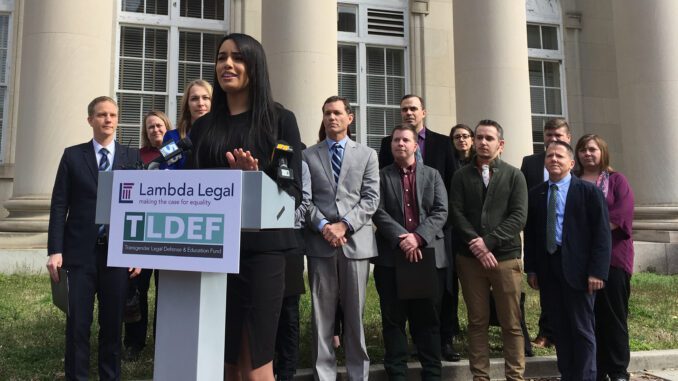
RALEIGH — A pair of consent rulings issued by an Obama-appointed federal judge direct the state’s Vital Statistics Program to alter birth certificates to match what sex a transgender person identifies as and another orders the N.C. State Health Plan to pay for transgender transition surgeries.
In both cases, plaintiffs were represented by Lambda Legal, the same firm which sued North Carolina over House Bill 2, the response by lawmakers to a Charlotte ordinance that would have allowed men to enter women’s bathrooms, locker rooms and other private spaces. House Bill 2 was given the name the “bathroom bill” by Democrats and LGBT activists.
In the consent judgment in the case of Campos v. Cohen, Loretta C. Biggs of the United States District Court Middle District of North Carolina Judge ordered entities within the state of North Carolina to change or reissue birth certificates based on a person’s perceived gender identity without requiring any proof of “sex reassignment surgery.”
A judge’s consent order or agreement is essentially a ruling based on a settlement agreement by both parties in the case with the goal of ceasing current litigation in favor of a judgement being issued.
Biggs’ order in Campos states all defendants in the case are “ permanently enjoined to provide certified copies of birth certificates to transgender individuals that accurately reflect their sex, consistent with their gender identity, without requiring the individual to provide proof of “sex reassignment surgery,” unless the individual expresses “sex reassignment surgery” as the reason for seeking the correction, and without the inclusion of information that would directly or indirectly disclose an individual’s transgender status on the face of the birth certificate.”
“I’m pleased to see this day happening, that the State of North Carolina now must recognize us for who we are. It was outrageous and dehumanizing that I was denied a birth certificate just because I didn’t have surgery,” said transgender plaintiff Lilith Campos in a news release. We should all agree that everyone deserves accurate and accessible identity documents that allow us to go through life and run errands with safety, dignity and respect.”
As a result of the order, a person can change their sex on a North Carolina birth certificate simply by submitting a sworn statement along with either a valid state-issued identification, U.S. Passport, or certification confirming an individual’s “gender identity” issued by a licensed health care professional or social worker.
Being able to change one’s sex on a birth certificate will impact everything from driver’s licenses to enrolling in public school and medical records to insurance of all types.
When Campos was filed, Mandy Cohen was secretary of the N.C. Department of Health and Human Services (NCDHHS). Due to her departure, her successor Kody Kinsley, was later named as a defendant. Under Kinsley, who is the first openly gay member of a cabinet agency in North Carolina, NCDHHS agreed to Biggs’ consent judgment.
The second ruling in the case of Kadel v. Folwell was also issued by Biggs.
“Defendants are PERMANENTLY ENJOINED from enforcing the Plan’s exclusion and are ORDERED to reinstate coverage for “medically necessary services for the treatment of gender dysphoria,” Biggs’ order in Kadel reads.
In a press statement on July 13, State Treasurer Dale Folwell announced the State Health Plan Board of Trustees said it “will not enforce the Plan’s benefit exclusion regarding treatment or studies leading to or in connection with sex transition or modifications and related care.”
The release noted action by the State Health Plan’s board was directly due to Biggs’ ruling and that “Biggs issued an order in favor of the plaintiffs that deprived the Plan of the benefit of a jury trial where experts could transparently debate whether sex transition operations are or are not medically necessary.”
The press statement went on to say, “We believe the judge’s order is legally incorrect, therefore it is now being appealed to the United States Court of Appeals for the Fourth Circuit.”
“We obviously disagree with the judge’s order that is, in essence, assuming responsibility for determining plan benefits for sex transition operations. We’re also disappointed the court decided to stop the case from being heard by a jury of North Carolinians,” Folwell said in the release. “However, I’ve always said that if the legislature or the courts tell me we have to provide for sex transition operations and treatments, I would.”
The State Health Plan’s exclusion of surgical and hormonal treatments related to the diagnosis of gender dysphoria was first instituted in the 1990s, according to the press release. In December of 2016, under then- in State Treasurer Janet Cowell, the board of trustees voted to not enforce the exclusion, however only for one year, expiring at the end of 2017.
Folwell’s release also notes that N.C. Attorney General Josh Stein refused to represent the State Health Plan in the case. Instead, Stein only represented the UNC System who was also named in the case, “which eventually settled for an undisclosed amount,” according to Folwell’s release.


